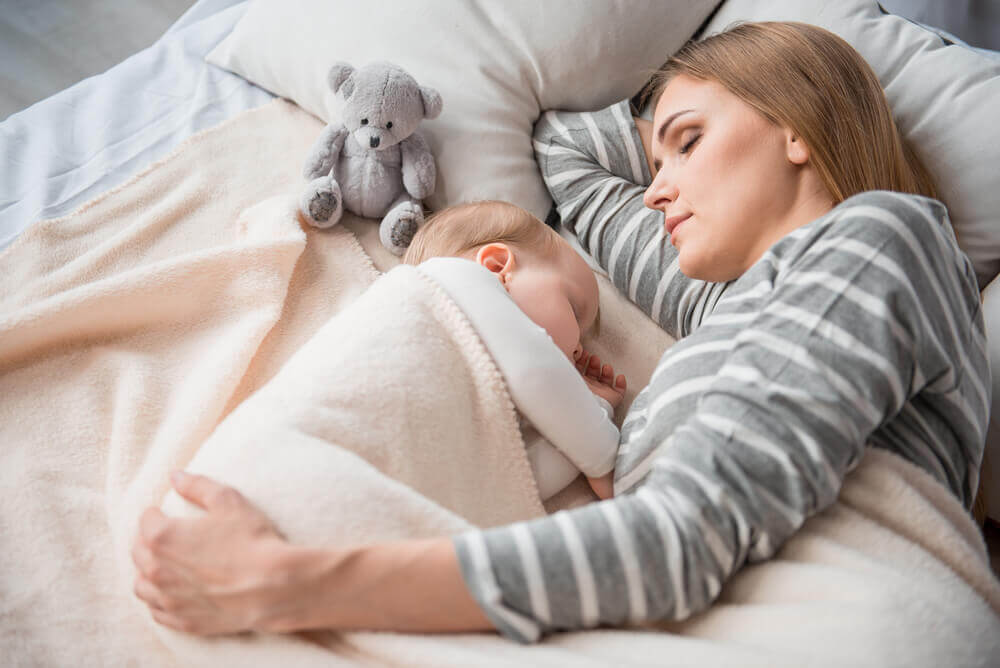How to Teach a Baby to Sleep through the Night

The best way to teach a baby to sleep through the night is co-sleeping. It’s certainly a rather controversial idea, with as many people for it as there are against it, but more families are now practicing co-sleeping with their babies.
It’s common in countries like the UK, Sweden, China, and Japan. In Spanish-speaking countries, for example, some parents sleep with their babies while others consider it taboo.
But now that people are talking so much about how to teach babies to sleep alone, they’re also concerned about how to teach them to sleep — as if it weren’t natural for all humans.
Is it possible to teach a baby to sleep?

There are specific methods you can use to teach a baby to sleep, like the Ferber method and the Estivill method. They do what they say they do: teach babies to sleep alone without their mother nearby.
The purpose of these methodologies is to teach a baby to sleep alone, in a different room than his or her mother, that’s a quiet space nothing like the cozy environment of the womb.
Many pediatricians tell first-time parents to use methods like the ones we mentioned. However, they expose a baby to stress at night, while co-sleeping matches baby’s sleep cycles and meets their needs better.
Sleep training methods are stressful for babies. They cry because they wants to be near mom, but she denies his request to be held. Then, they keep crying and only fall asleep out of exhaustion.
Why is co-sleeping more natural?
A baby spends a good portion of his 40 weeks in the womb sleeping. She knows how to sleep; there’s no reason to teach her. She already learned to sleep — and in a moving, noisy environment.
Her mother walked, exercised, went up and down stairs, and drove… and all the while she slept. She heard her mother talking, listened to her blood circulation, digestion, breathing… and still slept.
When a baby is born, she needs to hear her mother’s heartbeat. She needs to smell the scent of her skin, and she will cry if he’s not with her.
But even with co-sleeping recognized as the best way to keep babies happy, many mothers opt to put a crib in a separate room.
The mammal’s babies always sleep with their mothers. However, human beings — supposedly the most rational species — are the only ones that separate their young before they’re ready to be independent. It’s paradoxical, right?
You may also be interested in this article:
Is co-sleeping dangerous for babies?
There are all kinds of myths regarding co-sleeping and letting babies “cry it out.” They say that if parents come running every time their baby cries, they’re spoiling him. They say that parents could “crush” their baby if he sleeps with them.
In countries like Japan and China, babies sleep with their parents until they’re 5 or 6. They don’t wonder about how to teach their babies to sleep, and they don’t make them sleep in separate rooms. Countries like the UK and Sweden also practice co-sleeping.
In fact, sudden infant death syndrome (SIDS) is very rare in these countries. It’s the opposite, actually: SIDS is more common in babies who sleep separately from their parents.
What do the experts say?
Margo Sunderland, child psychologist, says in her book The Science of Parenting that co-sleeping is good for kids and helps them grow into healthy, balanced adults. Sunderland is a director of the Centre for Child Mental Health London and has published over 20 books.
Sleep training, or forcing a baby to sleep alone within a few weeks of being born, triggers the release of stress hormones, according to Sunderland. Instead, she says that co-sleeping up to 5 years of age is the best option. The reason is that up until that age (and sometimes longer), children experience separation anxiety.
Nils Bergman, pediatrician and neonatologist, and creator of the Kangaroo care method for premature babies agrees. His theory is that a baby needs skin-to-skin contact with her mother.
When she’s separated from her mother, it sets off negative emotions and hormones that are harmful to her brain. Bergman says that mothers should practice co-sleeping for at least the first 3 years of their child’s life.
Recommended reading:
8 things you should never do with a baby
What are the advantages of co-sleeping?

- A baby will feel safer and more protected. When she cries in the middle of the night, her mother is there to give him the comfort she needs and help her fall asleep again.
- Both mother and child will sleep better. A baby will wake up multiple times at night, and if she’s sleeping in the same room as her mother, she’ll feel her close and fall asleep more easily.
- There is no danger of parents crushing their baby. In fact, they will be more aware of their child’s needs and can be more attentive.
- If a baby needs to be nursed, her mother won’t have to get up and go to his room; she can be fed right away.
- Nighttime crying will almost disappear. A baby’s stress levels will be lower and she’ll be overall happier. Everyone in the house will sleep better.
- Co-sleeping allows working mothers to spend quality time with their babies and bond. When working moms get home, their babies reach out desperately for them, and when they nurse, they don’t want to let go. Co-sleeping gives mothers bonding time.
Final recommendations
Sleeping together as a family is a beautiful thing. It’s worth giving a shot! Consider it before submitting your child to the stress of sleeping in a room all by himself.
You can trust that all of your protective instincts will be on alert as you sleep together. This doesn’t apply to cases of alcohol or drug use, though, since parents could lose consciousness and harm their child.
If you practice co-sleeping, you’ll be there to give your baby the security and loves he needs to grow up healthy and happy. It’s also the best way to ensure that her brain develops to its full potential.
All cited sources were thoroughly reviewed by our team to ensure their quality, reliability, currency, and validity. The bibliography of this article was considered reliable and of academic or scientific accuracy.
- Jové, R. (2006). Dormir sin lágrimas: dejarle llorar no es la solución. La esfera de los libros. https://books.google.es/books?hl=es&lr=&id=GqjHAgAAQBAJ&oi=fnd&pg=PA163&dq=dormir+sin+lágrimas&ots=U322CjAGmV&sig=VlHXLTlw3hvJOPDB__rOHXfZwMU#v=onepage&q=dormir%20sin%20lágrimas&f=false
- Ruiz, K. (2019). Qué considerar al colechar. https://www.colibri.udelar.edu.uy/jspui/bitstream/20.500.12008/22806/1/Ruiz%2c%20Katheryn.pdf
- Sunderland, M. (2007). La ciencia de ser padres: consejos prácticos sobre el sueño, el llanto, el juego y la consecución de un bienestar emocional para toda la vida. Grijalbo.
- BERGMAN, N. (2005). El modo canguro de tener el bebé. Sextas jornadas internacionales sobre lactancia, Paris, Marzo. https://www.quenoosseparen.info/articulos/documentacion/documentos/elmetodocangurodetenerelbebe_nils_bergman.pdf
- Landa Rivera, L., Díaz-Gómez, M., Gómez Papi, A., Paricio Talayero, J. M., Pallás Alonso, C., Hernández Aguilar, M. T., … & Lasarte Velillas, J. J. (2012). El colecho favorece la práctica de la lactancia materna y no aumenta el riesgo de muerte súbita del lactante: Dormir con los padres. Pediatría Atención Primaria, 14(53), 53-60. http://scielo.isciii.es/pdf/pap/v14n53/revision1.pdf
This text is provided for informational purposes only and does not replace consultation with a professional. If in doubt, consult your specialist.








